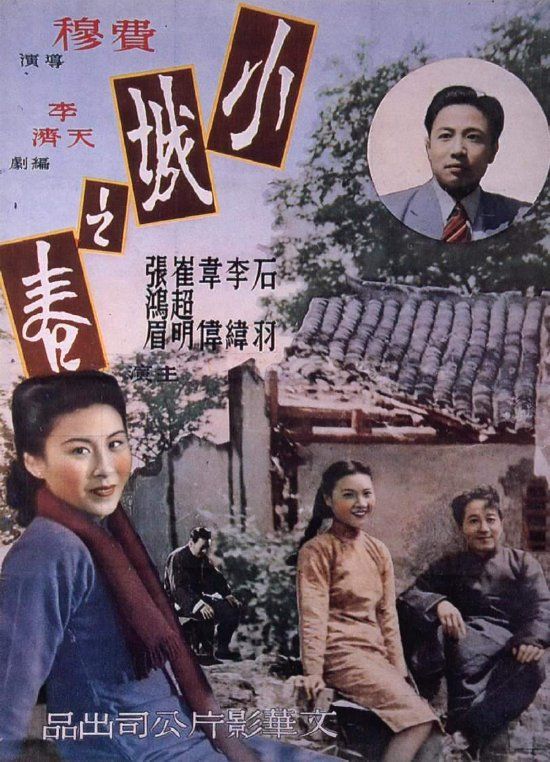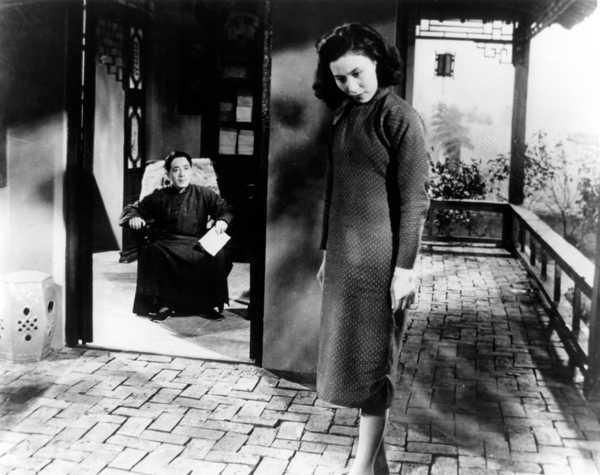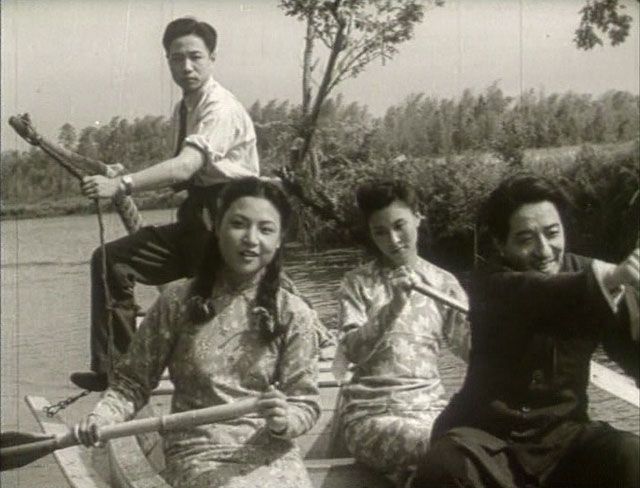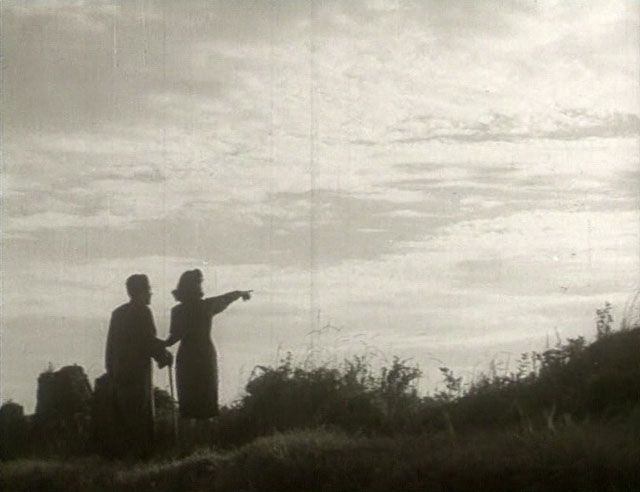Spring
in a Small Town (Xiao cheng zhi chun)
1948
Director: Fei Mu
Starring: Wei Wei, Shi Yu, Li Wei
When
I took my first, massive swipe at knocking off titles from 1001 Movies,
I went chronologically by decade, something I’m very glad of in
retrospect. The biggest advantage to
doing this was to encounter trends in filmmaking as they happened. The second advantage was watching how
national cinemas appeared, or perhaps disappeared. Take Germany for example: going
chronologically, I watched lots of German films in the beginning, then nothing,
not for decades. Rather poignant, that. On the flip side, there is only one Chinese
film that predates Spring in a Small Town in 1001 Movies, indicating that,
at least according to the editors of this book, Chinese cinema was still in its
birth during the early decades of filmmaking.
Spring in a Small Town was one of the first Chinese films to
rise to international stature, one of the first to be considered worth
preserving and worth seeing still to this day.
The
story is ripped straight from standard drawing room drama tales. Yuwen (Wei) has been married for eight years
to her invalided husband Liyan (Li). We
learn very early on that theirs is a loveless marriage, although they are still
affectionate with one another. She is
bored and suffocated by her endlessly repeated existence. Enter Zhichen (Shi), Liyan’s friend from
childhood and Yuwen’s former love. Her
resolve is thoroughly tested as the passion she used to feel and thought dead
and buried begins to rise again.
I
find it fascinating to discover the same sort of tropes I’m used to
encountering in Western costume dramas here, in a Chinese film from the
forties. I think that’s telling; it
indicates that there are similarities between all cultures, even in basic
romantic storylines. How often have I
seen this story played out, this sad sort of repressed love? Many, MANY times. I don’t hold this against Spring
in a Small Town, the fact that it’s telling a story I’ve heard before;
if anything, I like it more for telling a story I am familiar with from its own
unique cultural perspective. And the
China that is on display in Spring in a Small Town is from a
very distinct time period and culture.
(I will at this point reiterate my comparative ignorance about world
history – thank you, New Hampshire public education – so please, this is just a
quick review of what I taught myself on the interwebs; if I am grievously
mistaken on anything, please let me know.)
The second world war was over, China was no longer under Japanese
control, but the Communist Revolution had not yet taken over. This was a relatively short time period, and
the artistic result is a film with very little, if any, political
commentary. Spring in a Small Town is
a simple, sad little romance about a repressed woman and her long lost lover
who is definitely NOT her husband. It
does not feel allegorical or symbolic of larger issues. No, it is simply a romantic drama, nothing
more or less. This is probably a large
reason of why, when the Communist Revolution did succeed, Spring in a Small Town was
roundly denigrated, then forgotten, and nearly destroyed. I’m glad the film survived, though; it’s
worth a viewing, at least one, because of its purity of intent and because,
well, it certainly does repression well.
Spring
in a Small Town
gets very angsty. It moves slowly – it
is practically the definition of the slow burn.
And there’s little payoff. In my
first go around with Spring in a Small Town, I remember
feeling enraptured by this furtive, repressed romance between Yuwen and
Zhichen. This time, I was less affected
by it, but it still has its moments.
Despite the, um, VERY slow build up, I was still caught up when Yuwen
gets drunk, slips up, and throws herself at Zhichen. And it takes every smidgen of strength he has
to do the honorable thing. And I rather
enjoy it.
Spring
in a Small Town
is very reminiscent of Brief Encounter. Repressed woman narrating her own tale of
romantic feelings for a man, a doctor, who is not her husband? Brief Encounter. Frankly, Brief Encounter does it better –
loads better – but the voice over narration in particular I find important in Spring
in a Small Town. Just like in Brief
Encounter, it is crucial in providing us a critical window to Laura’s
soul so we understand her, we need that gateway to Yuwen, perhaps even more
so. As much as Laura presents a calm
façade to the outside world, Yuwen is one hundred times more serene on the
outside, never letting on for a second what might be happening under the
surface. This is actually a bit of a
detriment to the film; I needed more than a voice over to convince me of the
magnitude of Yuwen’s feelings, and the actress didn’t quite manage to convince
me on performance alone.
The
other major mark against Spring in a Small Town is the
condition of the film itself. This is,
sadly, a film that has not been preserved well in the slightest. The DVD is watchable, certainly, and the
English subtitles were clear (not always a given), but the image is hazy and
foggy and full of scratches. The sound
isn’t any better; it’s muffled and the background static is incredibly
loud. Even the original filming
conditions seem less than perfect, as the background noise cuts out in certain
parts of scenes, indicating that there was just no sound, PERIOD, while
recording. The story works well enough
in Spring
in a Small Town, but the logistics are incredibly lacking. It’s very difficult when it’s this bad not to
let this affect my read on a movie.
Spring
in a Small Town
was remade in China in the early 2000s, and I’m not surprised. The story is universal enough and works
pretty well, but the original film could use a brush up, more style, better
acting, and any sort of a soundtrack. I
have not seen the remake, but I’m glad at least someone thought it worthy of
telling again. Frankly, though, if I
want angsty romance, there are plenty of other films I’d choose over Spring
in a Small Town (Brief Encounter most definitely).
Arbitrary
Rating: 6/10




I liked this film well enough, but nothing in it really stuck with me. Like you said it was interesting seeing another culture's take on the age old story. By the way, 1934 Chinese film The Goddess made it in from the latest edition. I just watched it. I liked it.
ReplyDeleteIn regards to World History, did your education go something like this: Egypt, Roman Empire, Europe, the end? You should have snuck across the border into Maine. You might have been able to pass as a native as long as you changed all "er" suffixes to "ah". You would have been caught if you ever asked, "what's a 'sales tax'?", though.
My history education went like this:
Delete"Let's start in 1500's England so we can all understand why the Puritans came to America."
Two years later:
"And there you have it kids, up through 1980s America."
Seriously, Chip, I had two years of US History and ZERO world history of ANY kind. yaaaaaaaaaaaaaaaaaaay. This is the single biggest gap in my education, and given that I am a science person first and a literature person second, I have never had any compunction to remedy it. Didn't have to take history in college as my AP scores opted me out of it and didn't need it for my major. Philosophy, sociology, humanities, theater, yes, but no history. So I've got a major weak spot there.
I liked this one well enough, but I remember the print being egregiously bad. I didn't realize there was a remake--I'd love to see Criterion take a whack at this one and fix the print that exists.
ReplyDeleteI agree with you on Brief Encounter. I liked that better and I remember it more.
This is a film in desperate need of some company to take it under its wing and give the whole thing a facelift. I admit I'm a little curious about the remake.
DeleteSorry to come back so late, but this is how it goes when I insist on watching the films before reading about them.
ReplyDeleteI think you liked this one better than I did. Where you saw subtle acting I saw exageration. I think this felt like acting, over-acting all the way through. It is typical Chinese theater style, so it is no wonder, but it grates on me. I much much prefer Brief Encounter and In the Mood for Love.
cheap uggs
ReplyDeleteoakley outlet online
michael kors handbags
longchamp outlet
kobe basketball shoes
skechers shoes for men
yeezy sneakers
ugg boots uk
cheap oakley sunglasses
jordan shoes
yeezy boost
ReplyDeletekd shoes
christian louboutin
curry 6 shoes
nike air max 270
coach factory outlet
golden goose
Kanye West shoes
supreme
vapormax